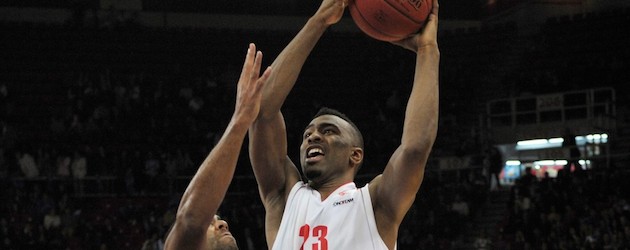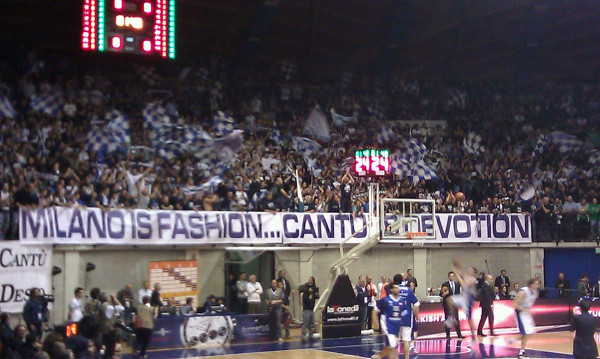By Rob Scott / @robscott33
Going into the Top 16 it was tempting to suggest that the 2014 Final Four would be played by the same teams as 2013’s. Three of those also contested the 2012 edition. I would say this exclusive party could be gatecrashed this year, but how can it be gatecrashed by the host? EA7 Emporio Armani Milano are free and clear in second spot in their group after beating the defending champions 88-86 Thursday night, in Piraeus. It the players resisted the temptation on the flight home to imagine an after-party at Giorgio’s place, it’s difficult for the observer not to wonder what a Final Four would feel like with the hosts involved on the court.
In the post-Suproleague era, i.e. 2002 onwards, there hasn’t been a Final Four without at least two of CSKA Moscow, Maccabi Tel Aviv, FC Barcelona or Panathinaikos. Partizan Belgrade in 2010 was the last ‘first-timer’ in this era, and you have to go back to the early 00s and the ghosts of Italian hoop history to find names that don’t repeat throughout the decade as Finalists: Skipper and Kinder Bologna, Benetton Treviso – we can only hope Montepaschi Siena does not become another one of these spectres of past glory. Unicaja Malaga was the other one-time interloper, and the best days of TAU Ceramica seem long gone.
Langford and Italy, perfectly suited
If Milano does manage to become a new name carved into the Euroleague honours board, it will largely be off the back of a player with a link to those heady days of Italian prominence. Keith Langford was MVP as Virtus (formerly Kinder) Bologna won the Eurochallenge in 2009 - the brash, confident scoring machine out of the University of Kansas, like so many smaller, hawkish guards toiling in the D-League, caught in the trap of NBA orthodoxy – “too small for the two, not really a playmaker” – finally settling into his destiny as a volume scoring vessel in Europe. He now leads Euroleague in the accumulating categories of Index Rating at 19.37 ,and points per game at 17.63.
After a trial year in Italy with Soresina in 2006/7 led to the briefest of two-night stands in San Antonio, a final banishment to the D-League sent him back to Italy with a point to prove. That 2007/8 season in Bologna promised European stardom, the reward a lucrative deal with one of the continent’s neophyte money-trees, Khimki Moscow.
Things turned sour after two years in Moscow Region. A season as designated ball-hog in Tel Aviv shaped Langford’s reputation as a one-dimensional dominator of possessions, able to accumulate only for himself, with little benefit to the team cause. Winning the Adriatic League in 2012 was the least Maccabi expected for that campaign, although they took Panathiniakos to five games in the Eurolegue playoffs. Heading to Milano as they attempted to buy their way into the Euroleague oligarchy did little to sway the nay-sayers.
That Milano team with Richard Hendrix, Ioannis Bourousis, Malik Hairston, Gianluca Basile and Omar Cook alongside Langford slumped to a miserable 3-7 record in the Regular Season with Sergio Scariolo at the helm. It was year two of a caricatured attempt to build a winner by accumulating glitzy names, with no attention paid to the structural engineering of successful teams.
That two-year running-joke coincided with unglamorous neighbours Cantu winning the admiration of the hoops intelligentsia, as their lower-budget operation came within a balletic Juan-Carlos Navarro head-jerk from making the playoffs in 2012. The banner at PalaDesio read ‘MILANO IS FASHION, CANTU IS DEVOTION’ and it was easy to nod along with the message.
Perhaps we shouldn’t be surprised, then, to see Milano finally threatening to join the elite not by throwing more money at more players who have succeeded elsewhere, but by copying the blueprint, and taking a couple of key players, from the small-town team that dominated Italian basketball over the last decade.
Banchi the man for this era
That Luca Banchi should have found himself in charge at Montepaschi Siena in 2012 was a symptom of the crisis that has engulfed the financial institutions at the heart of municipal capitalism in Europe since the end of this century’s first decade. Siena is a factory town, except the factory is the oldest surviving bank in the world, which recently made the kind of disastrous bets on derivatives that Milano made on big-name players. The assistant coach to Simone Piannigianni throughout Siena’s domestic domination had low expectations. The club that was literally bankrolled in the noughties had to make do with substantially less.
A stripped-down, austerity-era Siena bravely made the Top 16 last season and threatened to slip through all the way to a playoff series before Bobby Brown’s luck - and mid-range percentage – evaporated and they finished below the line. Despite the haircut to the team’s budget, they still managed their seventh successive Lega A championship.
The Banchi plan remains clear – space the floor even from positions one to five at times, to allow space for quick, fearless guards to attack the rim, and if you miss from deep just take the same shot next time. It’s a team ethos in which players with the talent to run ISO offense have the licence, as long as they operate within the overarching structure. Transplanted to a bigger budget, with better players, this collection of principles has translated into a burgeoning culture of winning.
From being a one-way player who pounds the ball only looking to score, Langford has been transformed. Finally, he has learned that facilitating others is not only better for the team, but creates a positive feedback loop in which he has more space to score.
The need to guard the three-point line so closely with shooters like Curtis Jerrells, David Moss and Kristian Kangur means Langford can go one-on-one with his man and either get to the rim, where he scores and/or picks up foul after foul, or shake him off and step back for the three.
He makes unassisted field goals from everywhere on the court at a rate way above average – none more striking than the audacious stepback three over Evangelos Mantzaris that sealed the win in Piraeus. Mantzaris is one of the finest on-ball defenders in the European game, and did everything possible to stand his ground against Langford, but still the ball swished through the net from 8 metres out.
Dramatic improvement, déja vu?
The improvement in Milano’s form since the end of the Regular Season has been dramatic – they qualified with a 5-5 record but sit at 6-3 in the second phase. Two players have been added since the season began. Gani Lawal arrived in Week Five, and immediately began cleaning the glass on the offensive end with ferocity. The real big addition was Daniel Hackett, who joins Banchi, Kangur and Moss in the Siena-alumni section of the locker room. There was a collective disappointed shrug when the most highly-prized recruit of the Christmas interlude chose to remain in Italy, but his and Lawal’s contribution to the Top 16 has drawn comparisons to the impact of Acie Law and Joey Dorsey at Olympiacos in 2012.
Even though their ability to make dramatic shots grabs attention, it’s on the defensive side of the ball that Milano’s quality is more statistically demonstrable. They have the Top 16’s best defensive rating and have limited opponents to the third lowest field goal percentage, behind only FC Barcelona and Olympiacos.
A red flag even bigger than the ones waved by the Olympiacos ultras is their third-from-bottom defensive rebound percentage. Neither Samuels nor Lawal counts this as a skill – perhaps their success on the offensive glass comes from knowing the tendencies of bad defensive rebounders? The ‘eye test’ says that this balance between offense and defense could easily be reversed though – this is a team that can make shots against anyone, but can they come up with a crucial defensive rebound when they really need it?
The other knock on this team was the extreme discrepancy between their home and road records. Going into the Olympiacos game they had beaten only Brose Baskets Bamberg on their travels, posting a 1-7 record, whilst only losing once at home, a narrow reverse to Real Madrid for a 9-1 slate. By showing that they go into a place like the SEF and not only win, but battle from 13 points down in the first quarter, they took a huge step forward into the ranks of the contenders.
The difference between Banchi’s Siena squad and this one is that it has players other than David Moss who are committed to playing defense. Moss is a one-man defensive anchor, sliding into passing lanes, disrupting ball movement with his long arms, recovering on the back line in Banchi’s preferred alignment of having the power forward hedge hard on ball-screens. Moss’ defensive role is key at the end of games. In addition, his ability to knock down spot-up threes means that keeping Alessandro Gentile on the bench doesn’t hurt the offense, with Langford, Hackett and Jerrells all able to create their own shot.
High fashion with a blue collar
Milano is a giant of the sport’s history, winning the Euroleague three times, and a further six continental titles of one kind of another. The team is owned by a company that brings in over a billion dollars of revenue each year. The era in which teams from Bologna, Vitoria-Gastiez and Siena could sit at the top table, without the backstop of a huge football club or a nationwide fanbase might be over, but at least Milano is succeeding not by throwing millions of euros at name-brand players.
It should perhaps be instructive for other teams with Final Four aspirations that they are finding success with an intelligently assembled roster under a low-profile coach, with role players like Bruno Cerella and Nicolo Melli who carry out the simple blue-collar elements of the game. The ostentatious, conspicuous consumption of the Scariolo era seems to be over.
This could all be premature - their struggles on the road could return, they could slip to third in the group and face a playoff series against CSKA Moscow or Real Madrid. They could lose to Maccabi over five games, though it seems like they would be the big favourites. But even the prospect of a newcomer in recent terms to the Final Four is exciting enough to create a sense of eager anticipation, and in the year that they host, the timing could not be better.

